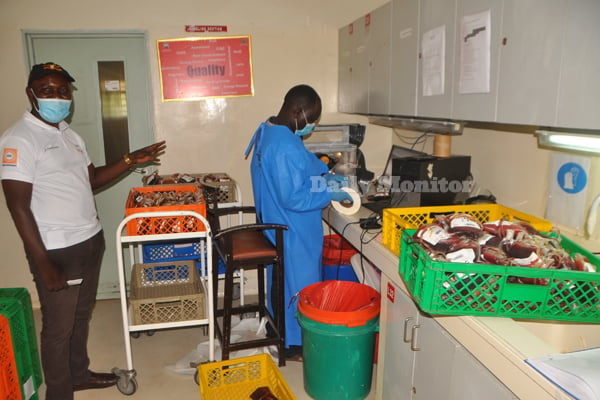Govt rejects sex workers, drunks as blood donors

Mr Samuel Davis Wante, the clinical team leader at Nakasero Blood Bank (left), with a volunteer from the International We love You Foundation, a South-Korean based NGO, on September 19, 2021. The volunteers donated blood. PHOTO/STEPHEN OTAGE
What you need to know:
- Officials say it costs $80 to process a unit of blood.
Uganda Blood Transfusion Services has said it no longer accepts blood from drunkards and donors with multiple sexual partners to avoid incurring losses.
Mr Samuel Davis Wante, the clinical team leader Nakasero Blood Bank, yesterday told Daily Monitor that they are finding it too costly to process blood from both male and female sex workers and drunkards because of their level of exposure to transfusable diseases.
“We normally find common infections such as HIV, Syphilis, Hepatitis B and C because these people move recklessly and get the infections. We do not take blood from such a person unless someone left prostitution 10 years ago,” he said.
Asked how they can identify a sex worker and whether people in polygamous marriages are affected, he said their research among polygamous marriages shows that such people are faithful.
He said they tightened the criteria for selecting blood donors because it costs $80 (about Shs282,000) to process a unit of blood.
He also added that recent studies have revealed the continuous blood donations, results in lowered risk of blood clots, reduces chances of getting cancers, lowers high blood pressure and it is also linked to prolonged life.
Yesterday, volunteers from the International We love You Foundation, a South Korean-based international NGO affiliated to the United Nations Department for Global Communication, joined an estimated 300,000 fellow volunteers in 67 countries across the world to donate blood.
According to Mr Francis Gidudu the deputy branch manager, the NGO was established by Zahng Gil Jah in 2001, to recruit volunteers to work in areas of promoting peace and unity around the world, healthcare and education.
In Uganda, they have been involved in donating to the Covid-19 taskforce and in blood donations.
Asked how they managed to survive during the lockdown when students are at home, Mr Wante said they have been mainly depending on soldiers and police from their training institutions to get blood.
However, they still face challenges of transporting blood to medical facilities and the continued sell of blood in health centres and yet the blood is got from the public.
WHO standard
According to the World Health Organisation’s Global Database on Blood Safety, a country should be able to collect blood equivalent to one percent of its population. Uganda has an estimated population of 45,903,545 people.
This means the country needs to collect 459,035 units of blood annually. According to Uganda Red Cross Society, it costs about Shs 331,500) to collect one unit of blood. This means UBTS needs Shs152.1 billion if it were to meet the WHO recommendations.



